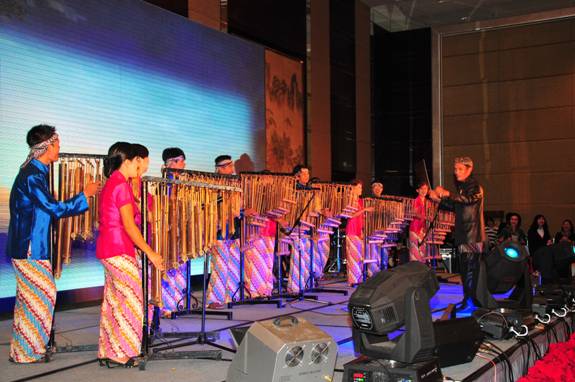Indonesian instrument heads to Beijing
- By Harvey Dzodin
 0 Comment(s)
0 Comment(s) Print
Print E-mail China.org.cn, May 31, 2012
E-mail China.org.cn, May 31, 2012
I never thought I would find a secret to happiness and one of Indonesia's secret weapons when I travelled 5,000 kilometers from Beijing to Bandung, capital of West Java, Indonesia. The euphoria I felt while listening to the local music more than justified the trip south. Soon, there are plans to deploy this weapon in Beijing on a massive scale.
Along with places of unrivaled scenic beauty such as Bali, and the extraordinary colorful batik clothing, the weapon is one of the most powerful in Indonesia's soft power arsenal. It's called the Angklung.
The Angklung is an instrument made from bamboo. It consists of two to four bamboo tubes suspended within a bamboo frame. The tubes are carefully cut by a craftsman to produce a single note, or chord, so at least several musicians must collaborate in order to play melodies. The instrument has been known since ancient times.
The instrument produces an uplifting sound, not unlike marrying a xylophone and a tambourine. While listening is joyful, being part of an Angklung orchestra under the direction of a skilled conductor is pure bliss. First, anyone can play it; no musical talent is required. And the satisfaction which comes from being a part of a larger harmony produces a sense of immense personal satisfaction.

Because of Angklung music's collaborative nature, there are many benefits that derive from this simple instrument. Playing promotes cooperation and mutual respect among musicians, together with discipline, responsibility, concentration, development of imagination and memory, as well as artistic and musical expression.
And making the instrument does not hurt the environment. The special black bamboo for the Angklung is only harvested two weeks out of the year when the cicadas sing, and is cut at least three bamboo segments above the ground, ensuring the bamboo shoot continues to grow.
The place to come under the Angklung's spell and study the instrument is Udjo's House of Angklung Village (Saung Angklung Udjo) in Bandung. This village is a music school, performance venue and ecology center. There are daily afternoon music performances by local children, including a demonstration of traditional stick puppets, as well as local folk dances. The highlight for me was playing this magical instrument with an international audience and local children, and the feeling of inner-warmth and connectedness was shared by all attendees.
The Angklung was added to UNESCO's Intangible Cultural Heritage List in November, 2010. It made the Guinness Book or Records when on July 9, 2011 in Washington, DC, 5,182 people performed as the largest Angklung orchestra to date.
Next year, Beijing will be the site of the next attempt to break this record. Upwards of 15,000 musicians, mostly Chinese, but also including several hundred participants from Indonesia. These musicians will bring Indonesia's soothing soft power weapon to China's capital.
Indonesia's Ambassador to China Imron Cotan said that he is thrilled that some of his friends are planning this record breaking performance, bringing the Angklung's heavenly music to Beijing. He said: "This is going to be one of the highlights of Sino-Indonesian collaboration in the cultural field. I am sure that the sentiment is shared by my friends here in Beijing."
Another connection to China is that one of the first performances of the modern version of the Angklung was at the April 1955 Bandung Conference, the site of which is now the Asian-African Conference Museum. It was there, under the leadership of Premier Zhou Enlai and others, that the doctrine of non-interference and non-intervention in a country's internal affairs was first annunciated. This policy has guided China's foreign policy until today.
Bandung is also known for its excellent shopping and restaurants, many of which offer fine Chinese, as well as Indonesian cuisine. Nearby is the dormant but still smoldering Tangkuban Perahu volcano, and the hot springs in the village of Ciater. Another interesting site is the Indonesian Safari Park in Cibeureum, where lions, tigers and a host of wild animals run free.





